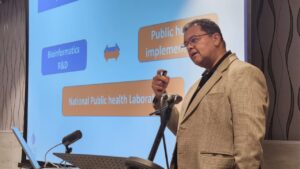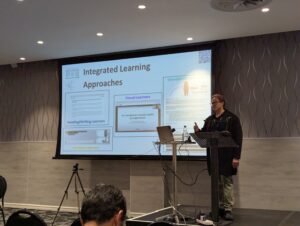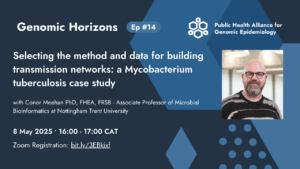
Cape Town
Public Health Alliance for Genomic Epidemiology (PHA4GE) hosted its first Open Meeting that was a full virtual experience on the 30th of March 2021. The event had more than one hundred participants that connected globally from the fields of genomic epidemiology and public health.
Established in 2019, PHA4GE is a global consortium focused on ensuring a rapid global genomic-driven public health response to disease outbreaks. This is through establishing global consensus data standards, document and share best practices, improve the availability of critical bioinformatic tools and resources and advocate for greater openness, interoperability, accessibility and reproducibility in public health bioinformatics.
The consortium’s Secretariat, that is based at the University of Western Cape (UWC), Cape Town, South Africa; facilitated the Meeting. In his opening remarks, Professor Christoffels elaborated on one of the ultimate goals of PHA4GE, “…what we really want to see is that public health laboratories exploit and utilize routine sequencing as a way of accelerating the production of health data that can inform a public health response”. He further outlined the purpose of the meeting, where the consortium’s different Working Groups in collaboration with partner organizations would give updates of their work.
Five talks and one panel discussion were on the line-up with speakers from Canada, South Africa, Argentina, United States of America, United Kingdom, Zambia and Ethiopia. These talks and panel discussion showcased real examples and responses towards pertinent global health topics that included coronavirus disease 2019 (COVID-19), anti-microbial resistance (AMR), training and workforce development in bioinformatics; and ethics and data sharing in health.
In her talk, Dr. Griffiths shared on the efforts of the consortium’s Data Structures Working Group in bridging the silos created in the collection of SARS-CoV-2 metadata. This is through the development of the PHA4GE SARS-CoV-2 genomic surveillance contextual data specification package; an open resource that may be utilised by any COVID-19 sequencing laboratories. As different contextual data standards already exist, the Working Group is not “re-inventing the wheel”, but “fine-tuning” and harmonising data structures to be reproducible and interoperable across different settings. Uptake of the PHA4GE metadata specification was noted to be amongst some genomics data repositories such as the NCBI (United States of America), DNAStack and DataHarmonizer (Canada), AusTrakka (Australia) and BaobabLIMS (South Africa). Guidance to use the metadata specification by current or future users was mentioned, which is through a standard operating procedure and relaying any other queries to the Working Group.
Dr. Anderson gave a description on collaborating with PHA4GE. She described the BaobabLIMS, an open source laboratory information management system (LIMS) for biobanking in South Africa. The biobank has a full workflow tracking collection of human samples, virus samples, analysis ( reporting?) and has an export functionality to submit into other repositories. Initially designed with modules on viral genomic analysis, she navigated through the system and demonstrated how the PHA4GE SARS-CoV-2 metadata specification is configured into LIMS. She also highlighted on the future directions of the biobank such as extending their system for external testing and upgrading their metadata for bacteria.
Dr. Gala and Dr. Campos spoke on the progress and challenges in AMR surveillance in Latin America and the Caribbean. Three major networks namely, ReLAVRA CCHD and PulseNet were noted to collect and share aggregated pathogens data at local and national and regional levels over time. ReLAVRA+, that falls within ReLAVRA; and the CCHD networks also focused on patient-level surveillance across 13 countries and 14 countries; respectively. Importantly, sequencing that was traditionally done on closed local and country-level platforms was increasingly having a push towards open source. Through the various consultation meetings held in the region, some of the areas requiring strengthening for whole genome sequencing included training in analysis and interpretation of SARS-CoV-2 data and standardized data analysis. While the COVID-19 may have slowed down the AMR efforts, it was seen to have presented an opportunity of increased surveillance in the region.
Dr. Campos explained further how the various gene detection tools used in collecting pathogens data in their region created similar challenges that impede reproducibility and interoperability of workflows. She also mentioned how the partnership with PHA4GE’s Data Structures Working Group becomes a catalyst in alleviating some of the challenges. This is through usage of a PHA4GE AMR metadata standard that helps generate a harmonized AMR gene detection report from the multiple gene detection tools. The specification is being piloted in the region on the common bacteria that attack the stomach (salmonella and shigella sonnei) and summary reports would be used to evaluate what is useful in Latin America and the Carribean. Professor Christoffels also indicated that the PHA4GE’s Infrastructure and Bioinformatics Pipelines Working Groups are working were packaging the tools for easy installation, usage and reproducibility across public health laboratories.
Professor Mulder gave an update on the PHA4GE Training & Workforce Development Working Group. Their vision is “to develop training standards and resources that will help to create a workforce able to effectively implement pathogen surveillance and epidemiology”. Training was planned to support PHA4GE working groups and public health laboratories on the collection, analysis and reporting on genomic data and applying quality controls throughout the process. Customized trainings would be tailored for different audiences such as epidemiologists, mathematicians, laboratory technicians, public health practitioners and officials. To ensure sustainability of the training program, training would also entail training the trainers; and also collaborating with other training groups such as Africa CDC NGS Academy, African Center of Excellence for Genomics of Infectious Disease and H3ABioNet.
Associate Professor Tiffin led the panel discussion for the PHA4GE Ethics and Data Sharing Working Group online forum. Panelists included Dr. Matimba, Dr. Lindsay and Ms. Bedeker. Associate Professor Tiffin emphasized on the inclusivity and open-to all approach in tackling issues relating to ethics and data sharing in genomic epidemiology, “…so we want to promote ethics research and develop ethics training but we also want to increase our capacity for having informed practical and agile solutions in the ethics and data sharing space… we really want to make sure that the work we do is around an inclusive and diverse equitable and collaborative ethics community that is inviting to everyone”.
Associate Professor Tiffin demonstrated how interested individuals could register and navigate the forum’s webpage. This included categories such as general, ethics and data sharing discussions, funding opportunities, information on trainings and courses, sharing information on ethics and data sharing publications; and collaboration on writing manuscripts. The panellists spoke on some of the content that was already up for discussion on the forum. Dr. Matimba was interested in developing a standard and metadata that curates information from ethics research projects; and developing an ethics and governance framework for translation and commercialization of human genomic data. Dr. Brianna was keen on understanding how successful genomic data sharing experiences could be shared, lessons that could be learnt to take things forward; and establishing a global principle to harmonize disparities in data sharing guidance. Ms. Bedeker described the challenges in anonymizing data and posed a question on whether genomic data could be really anonymized. Professor Tiffin wrapped up with a discussion topic on how the principles of access and benefit sharing in the Nagoya Protocol could be applied in genomics ethics and data sharing protocols and programs.
Dr. Tessema gave a talk on the Africa CDC’s roadmap on pathogen genomics and sequencing efforts in Africa and the current response to COVID-19 pandemic. A landscape analysis in over 22 institutions and 11 countries between 2018 and 2020 revealed the limited capacity and resources of pathogen genomics in Africa. In November 2019, the Institute of Pathogen Genomics (IPG) was launched to address these challenges. With the advent of COVID-19, the Africa Pathogen Genomics Initiative (APGI) was launched in October 2020. Both focus on strengthening the capacities in pathogen genomics and bioinformatics across Africa through partnerships, collaboration and coordination of various agencies. For COVID-19 sequencing, Africa CDC in partnership with Bill and Melinda Gates Foundation, Microsoft, Illumina, Nanopore and US CDC allocated funds to 12 specialized regional hubs consisting of regional public health laboratories; and specialized genomics and bioinformatics centers. This is to support personnel and other immediate needs for COVID-19 sequencing. H3ABioNet was also noted to provide the required training across the public health laboratories in Africa. Improvements were also noted on the availability of sequencing machines, “…before the COVID-19 outbreak there was one supplier or channel partner for Illumina which was based in Dubai and serving 54 African countries but today that reality has changed and there are more than 20 channel partners in the continent”.
In the closing remarks , Dr. MacCanell commended everyone for the successful Open meeting. He remarked on the growth and the increased activity within the consortium, reiterated on the challenges on the pathogen genomics and genomic epidemiology spaces; and how the advent of COVID-19 has aided in accelerating changes globally.
Video recordings and copies of slides can be found here
Affiliations:
*Except for Dr. Marcelo Gala and Dr. Dominique Anderson, all presenters are also part of the Public Health Alliance for Genomic Epidemiology (PHA4GE) Working Groups.
Professor Alan Christoffels, Dr. Dominique Anderson and Ms. Anja Bedeker. South African National Bioinformatics Institute (SANBI), South Africa
Dr. Emma Griffiths. British Columbia Centre for Disease Control (BCCDC), Canada
Dr. Marcelo Gala. Pan American Health Organization (PAHO), United States of America
Dr Josefina Campos. INEI-ANLIS “Dr. Carlos G. Malbrán” (National Institute of Infectious Diseases), Argentina
Profesor Nicola Mulder. Human Heredity and Health in Africa Bioinformatics Network (H3ABioNet), South Africa
Associate Professor Nicki Tiffin. Computational Biology Division, University of Cape Town, South Africa
Dr. Alice Matimba. Wellcome Genome Campus, United Kingdom
Dr. Brianna Lindsay. Center for International Health, Education, and Biosecurity, Zambia
Dr. Sofonias Tessema. Africa Centres for Disease Control and Prevention (CDC Africa), Ethiopia
Dr. Duncan MacCanell. Centers for Disease Control and Prevention (CDC), United States of America



